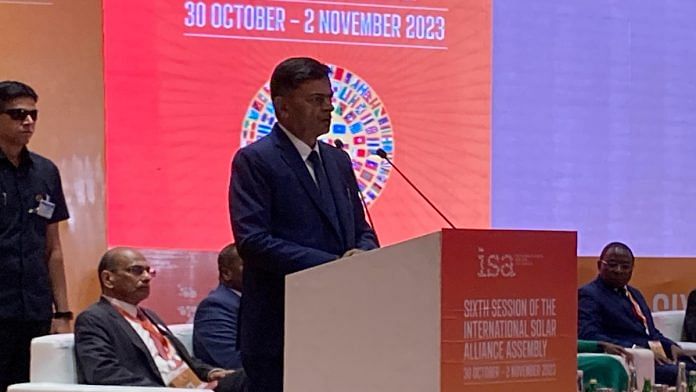New Delhi: India and the members of the International Solar Alliance (ISA) will soon operationalise an insurance fund and payment guarantee fund to ensure finances for solar projects reach countries in Africa, Union power and new and renewable energy minister R.K. Singh said Tuesday.
He was addressing a press conference during the sixth session of the ISA assembly — which seeks to promote solar energy globally — being held at New Delhi from 30 October to 2 November.
According to ISA director general Ajay Mathur, India is considering a $25 million grant to the Global Solar Facility (GSF), a body envisaged under the ISA framework to aid both the “‘quality’ (deepen the reach to low-income countries) and ‘quantity’ (multiply the global investments) of solar investments”.
The GSF is expected to “stimulate high potential solar technologies by attracting private capital to flow into underserved markets in Africa while ensuring a payment and insurance mechanism as a first-loss guarantee”.
The ISA proposes to commence GSF from Africa as the continent “has the highest potential of solar energy” but accounts for “only close to 1.3 percent of global installed solar capacity”, with nearly 600 million people without access to electricity.
“Green finance will become available at scale throughout countries that do not have access to energy,” said Singh as he pushed for better access to energy, especially among sub-Saharan African countries.
“Investments for solar projects are coming to India,” Singh said after the press conference, but the “problem” is financing of projects in Sub-Saharan Africa. This is where the payment guarantee fund would aid in investment in the region, he added.
Singh, who is also ISA president, said “733 million people are without access to electricity”. “Solar has the most potential to bridge this gap,” he added.
Conceptualised by India and France on the sidelines of the 21st Conference of Parties (COP) to the United Nations Framework Convention on Climate Change (UNFCCC) in 2015, the International Solar Alliance focuses on bringing access to energy, ensuring energy security and driving energy transition in member countries. It has 116 member countries, while 94 have ratified the ISA framework.
At the press conference, Mathur said four more countries have signed the ISA framework.
When asked about China — the world’s largest solar producer — not being a member of the alliance, Singh emphasised that the ISA is open to all members of the United Nations.
Also Read: At UN climate meet, alliance co-founded by India hopes to realise dream of a global solar grid
Investment in Africa a priority
At the press conference, Mathur said $310 billion was invested in solar energy in 2022, and this is expected to increase to $380 billion by the end of 2023. However, only “3 percent” of that investment was in Africa, he noted.
Mathur said the ISA has identified 20 startups across the continent for training and investment as part of its efforts to increase investment in Africa. The hope is that some of these startups will become the “Amazon” of the solar energy industry in Africa, he added.
Chrysoula Zacharopoulou, the French Minister of State for Development, Francophonie (nations where French is the first or a culturally significant language) and International Partnerships, said it was unbelievable that the construction of solar projects is cheaper in the US and the European Union in comparison to the African continent.
“The focus is on access for financing projects,” Zacharopoulou, the ISA co-president, added.
The current global climate — amid the Russian invasion of Ukraine and the crisis in West Asia — has made it clearer that “solar is the key building block of energy sovereignty”, she added.
Under the ISA’s viability gap funding (VGF) mechanism, the alliance currently provides a grant of $1,50,000 or 10 percent of the project cost (whichever is lower). The delegates during the ongoing session of the ISA assembly increased the range from 10 per cent to 35 per cent, Singh said.
Earlier in the day, four projects established through assistance from the ISA, in Malawi, Fiji, Seychelles and Kiribati, were inaugurated by Singh.
Singh explained that 12 dedicated projects by the ISA are to be operationalised by December 2023, adding that a total of 1 gigawatt worth of solar projects have been completed since 2015 and the body is helping to install another 9.5 gigawatts of solar energy across the world.
(Edited by Sunanda Ranjan)
Also Read: All about International Solar Alliance, co-founded by France & India, to promote solar energy



